人教版高中英语必修三课件:Unit 2 Healthy eating Grammar (共36张PPT)
文档属性
| 名称 | 人教版高中英语必修三课件:Unit 2 Healthy eating Grammar (共36张PPT) | 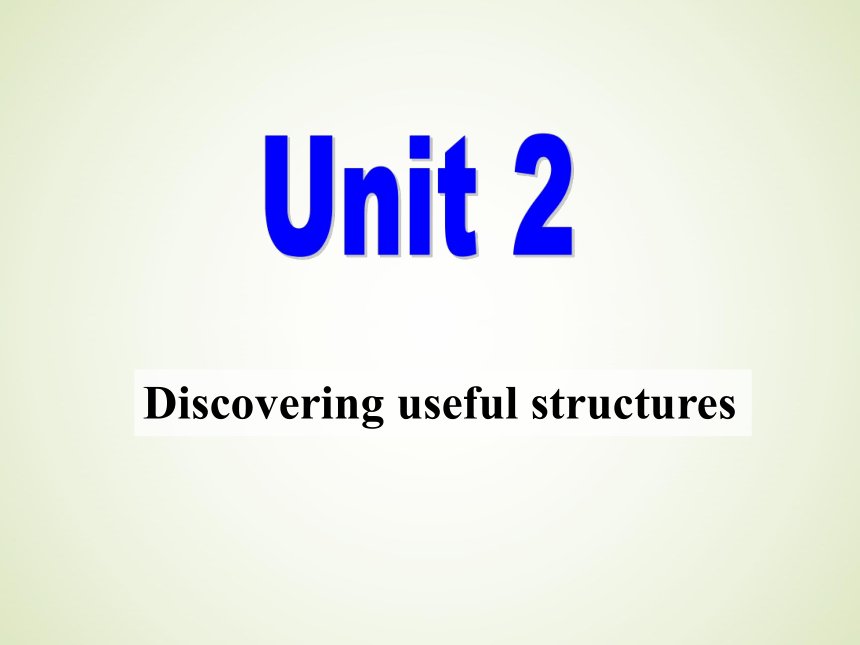 | |
| 格式 | zip | ||
| 文件大小 | 209.0KB | ||
| 资源类型 | 教案 | ||
| 版本资源 | 人教版(新课程标准) | ||
| 科目 | 英语 | ||
| 更新时间 | 2019-01-12 20:11:13 | ||
图片预览

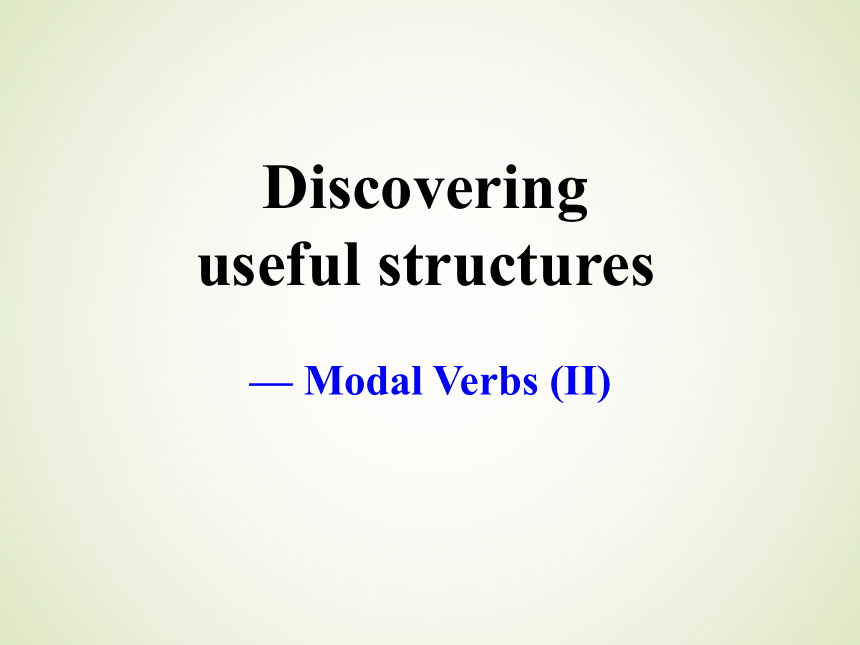
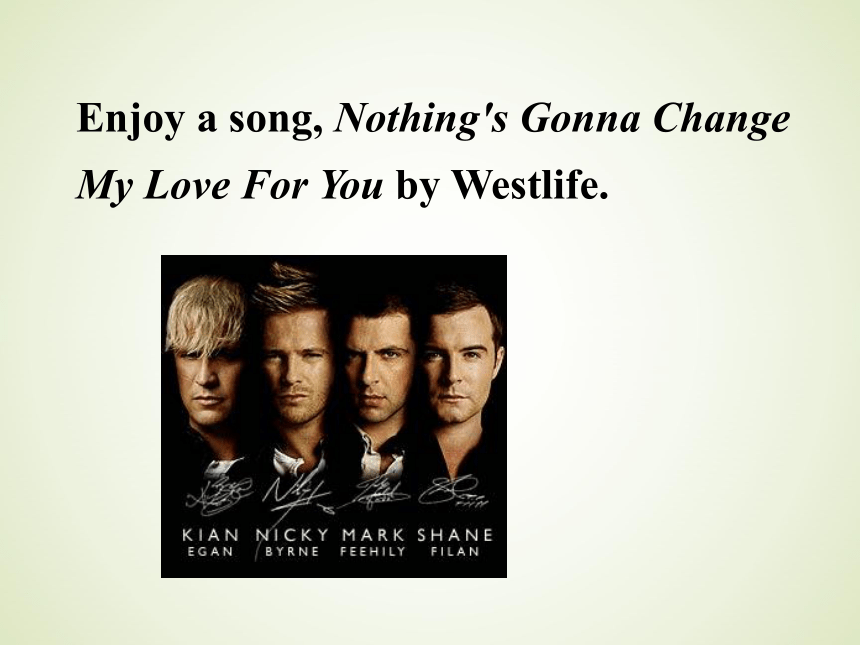
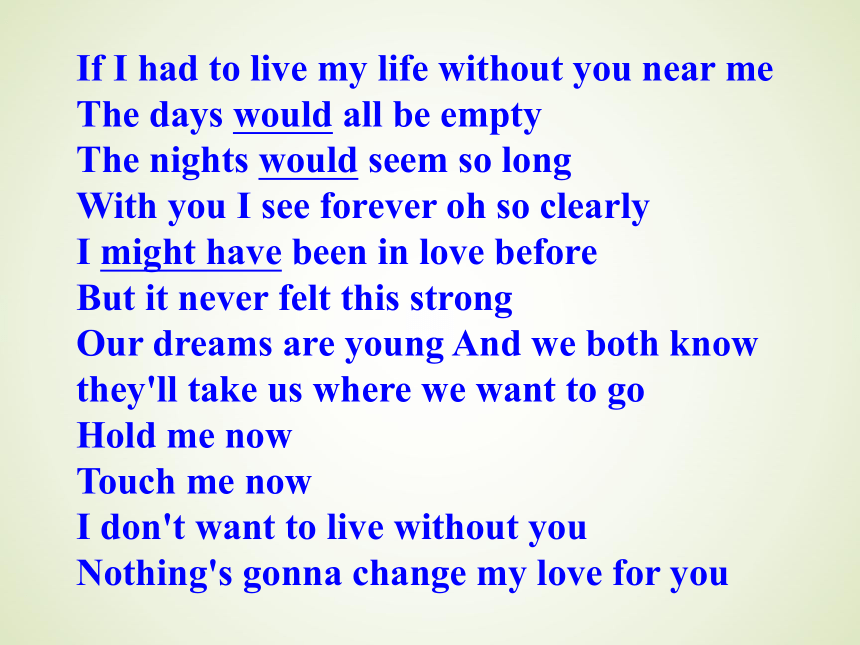
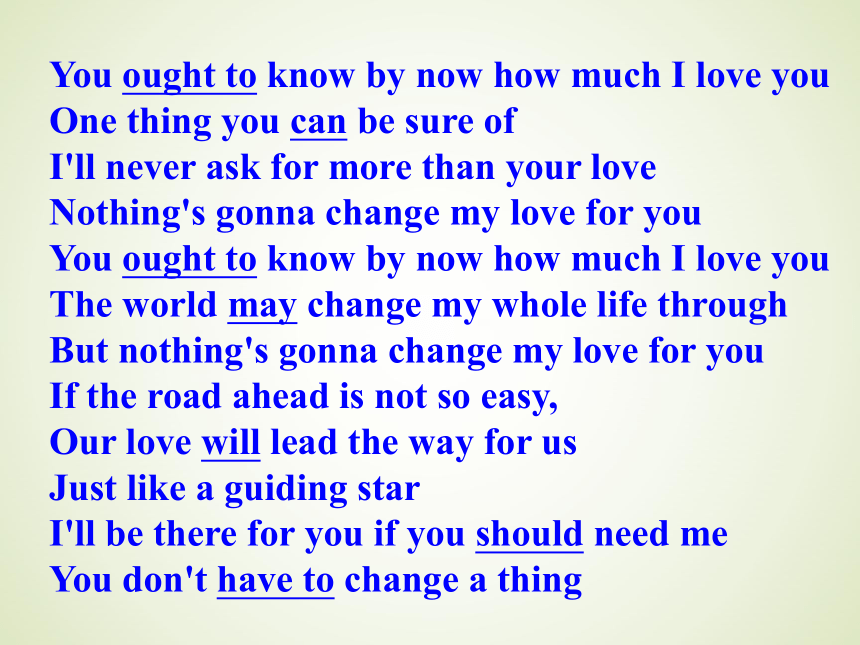
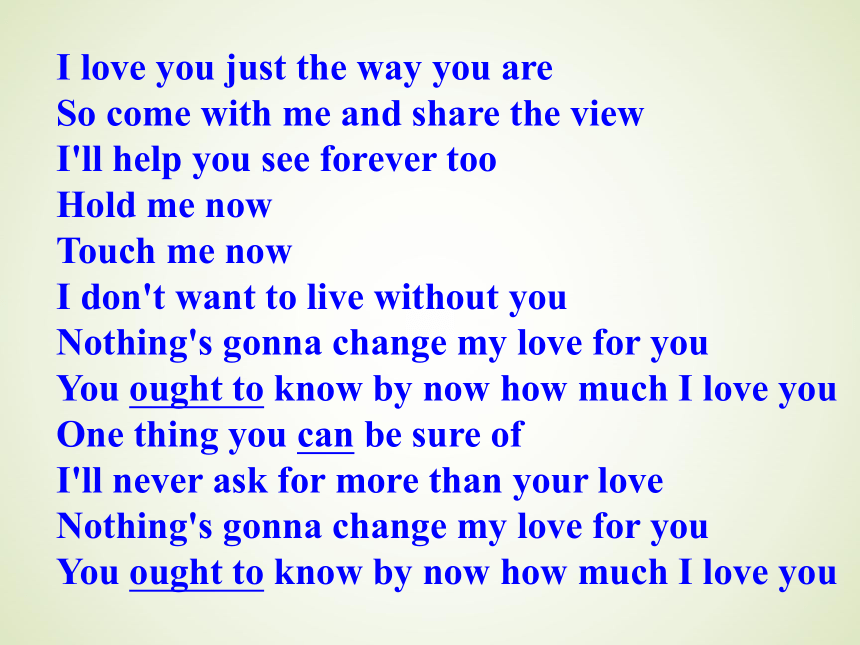
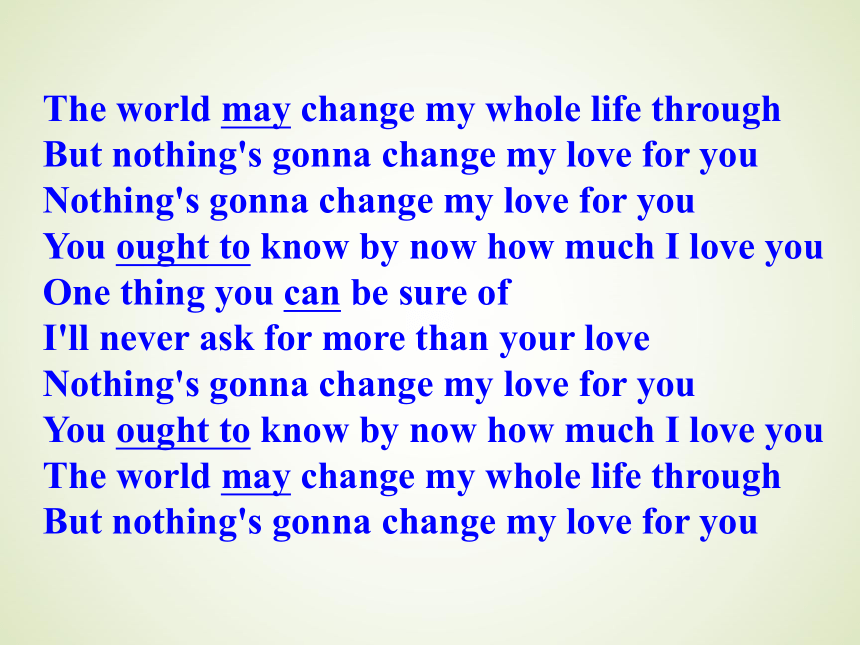
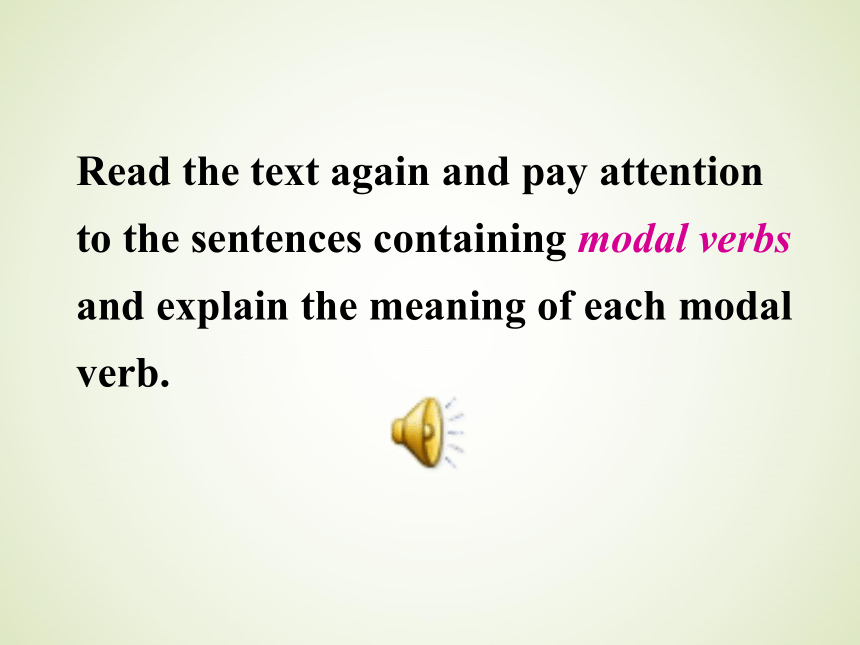
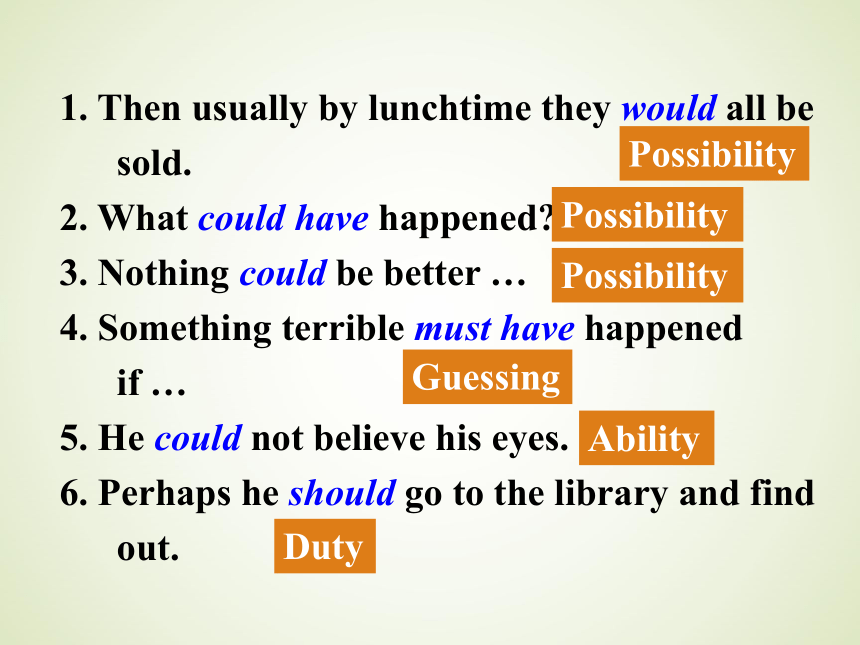
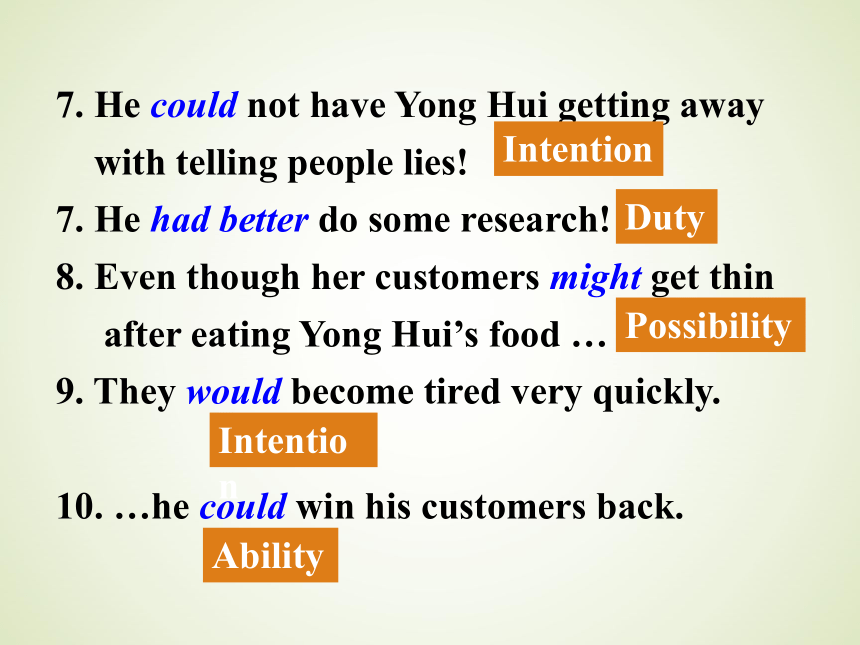
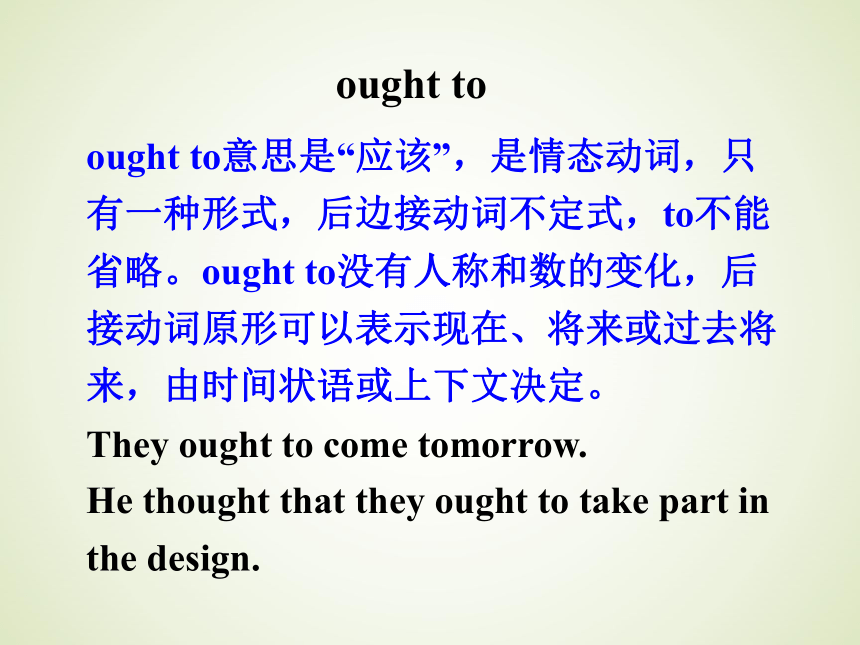
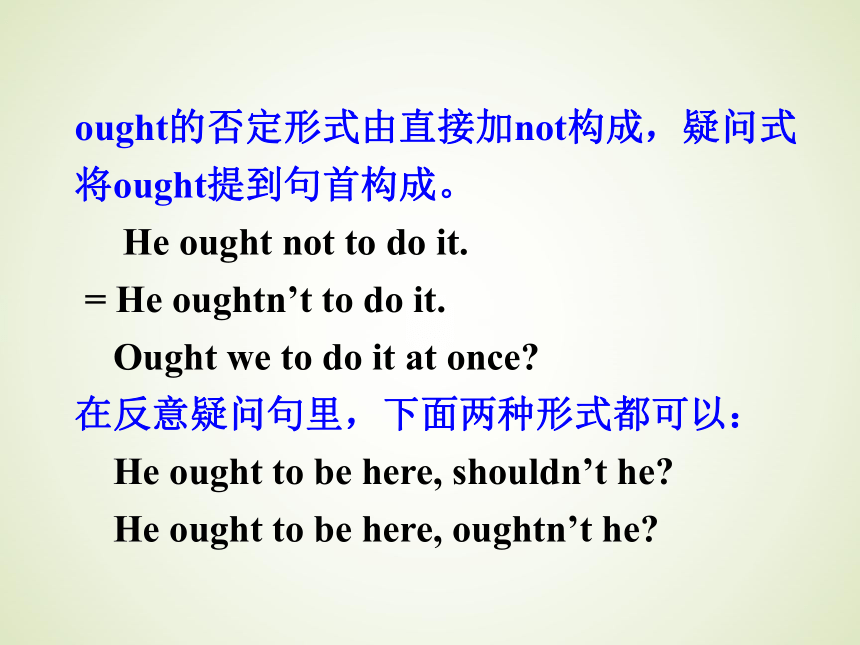
文档简介
课件36张PPT。Unit 2Discovering useful structuresDiscovering
useful structures
— Modal Verbs (II)Enjoy a song, Nothing's Gonna Change My Love For You by Westlife. If I had to live my life without you near me
The days would all be empty
The nights would seem so long
With you I see forever oh so clearly
I might have been in love before
But it never felt this strong
Our dreams are young And we both know
they'll take us where we want to go
Hold me now
Touch me now
I don't want to live without you
Nothing's gonna change my love for youYou ought to know by now how much I love you
One thing you can be sure of
I'll never ask for more than your love
Nothing's gonna change my love for you
You ought to know by now how much I love you
The world may change my whole life through
But nothing's gonna change my love for you
If the road ahead is not so easy,
Our love will lead the way for us
Just like a guiding star
I'll be there for you if you should need me
You don't have to change a thingI love you just the way you are
So come with me and share the view
I'll help you see forever too
Hold me now
Touch me now
I don't want to live without you
Nothing's gonna change my love for you
You ought to know by now how much I love you
One thing you can be sure of
I'll never ask for more than your love
Nothing's gonna change my love for you
You ought to know by now how much I love youThe world may change my whole life through
But nothing's gonna change my love for you
Nothing's gonna change my love for you
You ought to know by now how much I love you
One thing you can be sure of
I'll never ask for more than your love
Nothing's gonna change my love for you
You ought to know by now how much I love you
The world may change my whole life through
But nothing's gonna change my love for youRead the text again and pay attention to the sentences containing modal verbs and explain the meaning of each modal verb. 1. Then usually by lunchtime they would all be sold.
2. What could have happened?
3. Nothing could be better …
4. Something terrible must have happened if …
5. He could not believe his eyes.
6. Perhaps he should go to the library and find out.PossibilityPossibilityPossibilityGuessingAbilityDuty7. He could not have Yong Hui getting away
with telling people lies!
7. He had better do some research!
8. Even though her customers might get thin
after eating Yong Hui’s food …
9. They would become tired very quickly.
10. …he could win his customers back.IntentionDutyPossibilityIntentionAbilityought?to意思是“应该”,是情态动词,只有一种形式,后边接动词不定式,to不能省略。ought?to没有人称和数的变化,后接动词原形可以表示现在、将来或过去将来,由时间状语或上下文决定。
They?ought?to?come?tomorrow.
He?thought?that?they?ought?to?take?part?in?the?design. ought toought的否定形式由直接加not构成,疑问式将ought提到句首构成。
He?ought?not?to?do?it.
= He?oughtn’t?to?do?it.
Ought?we?to?do?it?at?once?
在反意疑问句里,下面两种形式都可以:
He?ought?to?be?here,?shouldn’t?he?
He?ought?to?be?here,?oughtn’t?he? 三者均表示建议,意为“应该”,“应当”或“最好做…”,三者的语气程度为渐强。
had better指一般性的建议,最弱。
should & ought to含义相近,区别在于ought to语气重,偏重责任、义务、道德、法律等方面。had better, should & ought toYou ought to help him because he is in trouble now.
(语气强,有命令意味)
You should have a rest after finishing your sports.
(一般性建议) ought?to?/ should have?done?
表本应该做而实际未做
You?ought?to?have?told?him?about?the?news.?
He?shouldn’t?have?been?told?about?the?news.
You?should?have?got?up?early. have?to?强调客观需要,有人称、时态的变化 而must则表示主观愿望、主观看法,只能用于一般现在时和一般将来时。
— Would?you?like?to?come?to?my?house?on?
National?Day?
— Thank?you,?I’d?love?to.?But?I?have?to?see?my?
uncle?on?that?day.
We?must?finish?the?work?before?lunch. have to & mustMust they do…?
Yes, they must.
No, they needn’t/don’t have to. need和dare既可用作情态动词,也可用作实义动词。用作情态动词时,主要用于否定句和疑问句。用作实义动词时,可用于各种句式。
1. 用作情态动词
You?needn’t?telephone?him?now.???
I?don’t?think?you?need?worry.???
She?dare?not?go?out?alone?at?night.?
? How?dare?you?say?I’m?unfair??? dare & need2. 用作实义动词
You?don’t?need?to?do?it?yourself.???
We?need?to?tell?them?the?news.
We should dare to give our own opinion.
He did not dare (to) look up.
I dare say he’ll come again.
(I dare say…为固定习语)? 注意对need问句的回答:
— Need I finish the work today?
— Yes, ________________.
No, ________________.
No, ________________.you mustyou needn’tyou don’t have toneedn’t 对其它情态动词的回答:
— Shall I tell John about it?
— No, you __________.
— No, you __________. — Must we do it now?
— No, you __________.
— No, you __________.needn’tdon’t have toneedn’tdon’t have to【2015·天津】7. I ______ have worried before I came to the new school, for my classmates here are very friendly to me.
A. mightn’t B. mustn’t
C. needn’t D. couldn’t
【解析】句意:我来新学校之前本没有必要担心,因为在这里的同学对我非常友好。needn’t have done本没有必要做某事,表示实际上已经做了某事。根据句意可知选C。C高考真题【2015·北京】29.—Can’t you stay a little longer?
—It’s getting late. I really _____ go now, My daughter is home alone.
A. may B. can C. must D. dare
【解析】句意:——你不能再多待会儿吗?——很晚了,我必须得走了。我女儿一个人在家。A. may可能,可以,也许;B. can能,会;C. must必须,必然要,必定会;D. dare敢,胆敢。结合句意,故选C。C(2014江苏卷)31. It was sad to me that they, so poor themselves, _____ bring me food.
A. might B. would
C. should D. could
【解析】句意:让我难过的是,如此贫穷的他们竟然给我带来了食物。 might也许;would会,过去常常做某事;should应该,竟然;could能够;根据句意可知本句中的should表示“竟然”。故C正确。C(2014重庆卷 )3. I’ve ordered some pizza, so we _____ worry about cooking when we get home tired.
A. can’t B. dare not
C. needn’t D. may mot
【解析】句意:我已经点了一些披萨,所以当我们很累地到家的使用,不必担心做饭的问题。 can’t不可能;做不到;dare not不敢;needn’t 不必;may not也许不;根据句意说明C正确。C (2013陕西) My mom suggests that we ______ eat out for a change this weekend.
A. should B. might
C. could D. would
(2013四川) Why are your eyes so red? You _______ have slept well last night.
A. can't B. mustn't
C. needn't D. won'tAA I _____ use a clock to wake me up because at six o’clock each morning the train comes by my house. (2012全国高考I)
A. couldn’t B. mustn’t
C. shouldn’t D. needn’t
The new law states that people _____ drive after drinking alcohol. (2012上海高考)
A. wouldn't B. needn't
C. won't D. mustn'tDD It’s quite warm here; we _____ turn the heating on yet. (2012天津高考)
A. couldn’t B. mustn’t
C. needn’t D. wouldn’t
We _____ have bought so much food now that Suzie won’t be with us for dinner. (2012江西高考)
A. may not B. needn’t
C. can’t D. mustn’tCB1. You ____ your tooth pulled out before it rot
completely. A. had better got B. had to get better
C. had better to get D. had better get 2. When we got to the cinema, the film hasn’t
started yet, so we ____. A. needn’t hurry B. didn’t need hurry
C. needn’t to hurry D. needn’t have hurried 3. It was really very dangerous; you ____ him
seriously. A. might have injured B. could injure
C. should have injured D. must injure DDAPractice4. As he had heart attack, he was told that he
____ continue the work. A. needn’t B. may not C. mustn’t D. can't
5. We ought to help each other in our work, ____?
A. oughtn’t we B. should we
C. shouldn't we D. ought to we
6. Two eyes ____ see more than one.
A. can B. may C. will D. should
7. When I got to the cinema, the film had already
started; I ____ there earlier.
A. ought to get B. ought to have got
C. must have got D. must getBAAC 8. I thought you ____ like something to read, so
I have brought you some books.
A. may B. might C. would D. must
9. Where is my pen? I ____ it.
A. might lose B. would have lost
C. should have lost D. must have lost
10. I didn’t hear the phone. I ___ asleep
A. must be B. must have been
C. should be D. should have beenB D B 11. — There were already five people in the car,
but they managed to take me as well.
— It ____ a comfortable journey.
A. can’t be B. shouldn’t be
C. mustn’t have been D. couldn’t have been
12. It’s nearly seven o’clock. Jack ___ be here at
any moment.
A. must B. need C. should D. could D C13. — Did the train arrive in time?
— No. It ____ two hours ago.
A. must have arrived
B. ought to have arrived
C. must arrive
D. ought to arrive
14. — Must I drive to his house and pick up the
children? ?
— No, ??????? . ? A. you shouldn’t B. you might not ?
C. you needn’t ? D. you mustn’tB C 15. We didn’t see Tom at the meeting yesterday.
He ??????? it.
A. mustn’t have attended?
B. cannot have attended
C. needn’t have attended?
D. would have not attendedB 16. There is someone knocking at the door.
_____ it be Tom? ? A. Can? B. Must?
C. Should? D. Ought toA 17. You ______ take me to the station, and my brother is taking me.
A. don’t have to B. mustn’t
C. can’t D. shouldn’t
18. — Must I hand in the homework now?
— ______. You can hand it in tomorrow morning.
A. Yes, you must B. No, you needn’t
C. Yes, you need D. No, you mustn’t A B 19. — Mum, I climbed to the top of the shelf
and got the Teddy Bear.
— My goodness! You may have hurt ???? yourself. You _____ do that again.
A. don’t have to B. may not
C. needn’t D. mustn’t
20. Everybody is working hard. There _____ be trouble in finishing the work on time.
A. ought not to B. needn’t
C. mustn’t D. ought to not D A Homework 1. Summarize the rules of the modal verbs in your own way.
2. Finish the exercises in Discovering useful structures.
3. Finish exercises in Using structure in Workbook.
useful structures
— Modal Verbs (II)Enjoy a song, Nothing's Gonna Change My Love For You by Westlife. If I had to live my life without you near me
The days would all be empty
The nights would seem so long
With you I see forever oh so clearly
I might have been in love before
But it never felt this strong
Our dreams are young And we both know
they'll take us where we want to go
Hold me now
Touch me now
I don't want to live without you
Nothing's gonna change my love for youYou ought to know by now how much I love you
One thing you can be sure of
I'll never ask for more than your love
Nothing's gonna change my love for you
You ought to know by now how much I love you
The world may change my whole life through
But nothing's gonna change my love for you
If the road ahead is not so easy,
Our love will lead the way for us
Just like a guiding star
I'll be there for you if you should need me
You don't have to change a thingI love you just the way you are
So come with me and share the view
I'll help you see forever too
Hold me now
Touch me now
I don't want to live without you
Nothing's gonna change my love for you
You ought to know by now how much I love you
One thing you can be sure of
I'll never ask for more than your love
Nothing's gonna change my love for you
You ought to know by now how much I love youThe world may change my whole life through
But nothing's gonna change my love for you
Nothing's gonna change my love for you
You ought to know by now how much I love you
One thing you can be sure of
I'll never ask for more than your love
Nothing's gonna change my love for you
You ought to know by now how much I love you
The world may change my whole life through
But nothing's gonna change my love for youRead the text again and pay attention to the sentences containing modal verbs and explain the meaning of each modal verb. 1. Then usually by lunchtime they would all be sold.
2. What could have happened?
3. Nothing could be better …
4. Something terrible must have happened if …
5. He could not believe his eyes.
6. Perhaps he should go to the library and find out.PossibilityPossibilityPossibilityGuessingAbilityDuty7. He could not have Yong Hui getting away
with telling people lies!
7. He had better do some research!
8. Even though her customers might get thin
after eating Yong Hui’s food …
9. They would become tired very quickly.
10. …he could win his customers back.IntentionDutyPossibilityIntentionAbilityought?to意思是“应该”,是情态动词,只有一种形式,后边接动词不定式,to不能省略。ought?to没有人称和数的变化,后接动词原形可以表示现在、将来或过去将来,由时间状语或上下文决定。
They?ought?to?come?tomorrow.
He?thought?that?they?ought?to?take?part?in?the?design. ought toought的否定形式由直接加not构成,疑问式将ought提到句首构成。
He?ought?not?to?do?it.
= He?oughtn’t?to?do?it.
Ought?we?to?do?it?at?once?
在反意疑问句里,下面两种形式都可以:
He?ought?to?be?here,?shouldn’t?he?
He?ought?to?be?here,?oughtn’t?he? 三者均表示建议,意为“应该”,“应当”或“最好做…”,三者的语气程度为渐强。
had better指一般性的建议,最弱。
should & ought to含义相近,区别在于ought to语气重,偏重责任、义务、道德、法律等方面。had better, should & ought toYou ought to help him because he is in trouble now.
(语气强,有命令意味)
You should have a rest after finishing your sports.
(一般性建议) ought?to?/ should have?done?
表本应该做而实际未做
You?ought?to?have?told?him?about?the?news.?
He?shouldn’t?have?been?told?about?the?news.
You?should?have?got?up?early. have?to?强调客观需要,有人称、时态的变化 而must则表示主观愿望、主观看法,只能用于一般现在时和一般将来时。
— Would?you?like?to?come?to?my?house?on?
National?Day?
— Thank?you,?I’d?love?to.?But?I?have?to?see?my?
uncle?on?that?day.
We?must?finish?the?work?before?lunch. have to & mustMust they do…?
Yes, they must.
No, they needn’t/don’t have to. need和dare既可用作情态动词,也可用作实义动词。用作情态动词时,主要用于否定句和疑问句。用作实义动词时,可用于各种句式。
1. 用作情态动词
You?needn’t?telephone?him?now.???
I?don’t?think?you?need?worry.???
She?dare?not?go?out?alone?at?night.?
? How?dare?you?say?I’m?unfair??? dare & need2. 用作实义动词
You?don’t?need?to?do?it?yourself.???
We?need?to?tell?them?the?news.
We should dare to give our own opinion.
He did not dare (to) look up.
I dare say he’ll come again.
(I dare say…为固定习语)? 注意对need问句的回答:
— Need I finish the work today?
— Yes, ________________.
No, ________________.
No, ________________.you mustyou needn’tyou don’t have toneedn’t 对其它情态动词的回答:
— Shall I tell John about it?
— No, you __________.
— No, you __________. — Must we do it now?
— No, you __________.
— No, you __________.needn’tdon’t have toneedn’tdon’t have to【2015·天津】7. I ______ have worried before I came to the new school, for my classmates here are very friendly to me.
A. mightn’t B. mustn’t
C. needn’t D. couldn’t
【解析】句意:我来新学校之前本没有必要担心,因为在这里的同学对我非常友好。needn’t have done本没有必要做某事,表示实际上已经做了某事。根据句意可知选C。C高考真题【2015·北京】29.—Can’t you stay a little longer?
—It’s getting late. I really _____ go now, My daughter is home alone.
A. may B. can C. must D. dare
【解析】句意:——你不能再多待会儿吗?——很晚了,我必须得走了。我女儿一个人在家。A. may可能,可以,也许;B. can能,会;C. must必须,必然要,必定会;D. dare敢,胆敢。结合句意,故选C。C(2014江苏卷)31. It was sad to me that they, so poor themselves, _____ bring me food.
A. might B. would
C. should D. could
【解析】句意:让我难过的是,如此贫穷的他们竟然给我带来了食物。 might也许;would会,过去常常做某事;should应该,竟然;could能够;根据句意可知本句中的should表示“竟然”。故C正确。C(2014重庆卷 )3. I’ve ordered some pizza, so we _____ worry about cooking when we get home tired.
A. can’t B. dare not
C. needn’t D. may mot
【解析】句意:我已经点了一些披萨,所以当我们很累地到家的使用,不必担心做饭的问题。 can’t不可能;做不到;dare not不敢;needn’t 不必;may not也许不;根据句意说明C正确。C (2013陕西) My mom suggests that we ______ eat out for a change this weekend.
A. should B. might
C. could D. would
(2013四川) Why are your eyes so red? You _______ have slept well last night.
A. can't B. mustn't
C. needn't D. won'tAA I _____ use a clock to wake me up because at six o’clock each morning the train comes by my house. (2012全国高考I)
A. couldn’t B. mustn’t
C. shouldn’t D. needn’t
The new law states that people _____ drive after drinking alcohol. (2012上海高考)
A. wouldn't B. needn't
C. won't D. mustn'tDD It’s quite warm here; we _____ turn the heating on yet. (2012天津高考)
A. couldn’t B. mustn’t
C. needn’t D. wouldn’t
We _____ have bought so much food now that Suzie won’t be with us for dinner. (2012江西高考)
A. may not B. needn’t
C. can’t D. mustn’tCB1. You ____ your tooth pulled out before it rot
completely. A. had better got B. had to get better
C. had better to get D. had better get 2. When we got to the cinema, the film hasn’t
started yet, so we ____. A. needn’t hurry B. didn’t need hurry
C. needn’t to hurry D. needn’t have hurried 3. It was really very dangerous; you ____ him
seriously. A. might have injured B. could injure
C. should have injured D. must injure DDAPractice4. As he had heart attack, he was told that he
____ continue the work. A. needn’t B. may not C. mustn’t D. can't
5. We ought to help each other in our work, ____?
A. oughtn’t we B. should we
C. shouldn't we D. ought to we
6. Two eyes ____ see more than one.
A. can B. may C. will D. should
7. When I got to the cinema, the film had already
started; I ____ there earlier.
A. ought to get B. ought to have got
C. must have got D. must getBAAC 8. I thought you ____ like something to read, so
I have brought you some books.
A. may B. might C. would D. must
9. Where is my pen? I ____ it.
A. might lose B. would have lost
C. should have lost D. must have lost
10. I didn’t hear the phone. I ___ asleep
A. must be B. must have been
C. should be D. should have beenB D B 11. — There were already five people in the car,
but they managed to take me as well.
— It ____ a comfortable journey.
A. can’t be B. shouldn’t be
C. mustn’t have been D. couldn’t have been
12. It’s nearly seven o’clock. Jack ___ be here at
any moment.
A. must B. need C. should D. could D C13. — Did the train arrive in time?
— No. It ____ two hours ago.
A. must have arrived
B. ought to have arrived
C. must arrive
D. ought to arrive
14. — Must I drive to his house and pick up the
children? ?
— No, ??????? . ? A. you shouldn’t B. you might not ?
C. you needn’t ? D. you mustn’tB C 15. We didn’t see Tom at the meeting yesterday.
He ??????? it.
A. mustn’t have attended?
B. cannot have attended
C. needn’t have attended?
D. would have not attendedB 16. There is someone knocking at the door.
_____ it be Tom? ? A. Can? B. Must?
C. Should? D. Ought toA 17. You ______ take me to the station, and my brother is taking me.
A. don’t have to B. mustn’t
C. can’t D. shouldn’t
18. — Must I hand in the homework now?
— ______. You can hand it in tomorrow morning.
A. Yes, you must B. No, you needn’t
C. Yes, you need D. No, you mustn’t A B 19. — Mum, I climbed to the top of the shelf
and got the Teddy Bear.
— My goodness! You may have hurt ???? yourself. You _____ do that again.
A. don’t have to B. may not
C. needn’t D. mustn’t
20. Everybody is working hard. There _____ be trouble in finishing the work on time.
A. ought not to B. needn’t
C. mustn’t D. ought to not D A Homework 1. Summarize the rules of the modal verbs in your own way.
2. Finish the exercises in Discovering useful structures.
3. Finish exercises in Using structure in Workbook.
同课章节目录
